- Home
- McBain, Ed
Killer's Payoff Page 4
Killer's Payoff Read online
Page 4
“It’s attractive.” She smiled. “The very latest thing, you know.”
“I try to keep in tune with the new fashions,” Hawes said, returning the smile. “Do you have any idea how much money Kramer was making?”
“No. A lot, I suppose. This apartment isn’t exactly a cold-water flat.”
“Hardly,” Hawes said. “Do you know what the rental runs?”
“I think it’s three-fifty a month.”
Hawes whistled.
“Who invents these stories about crime not paying?” Nancy said.
“Does it?” Hawes asked.
“Well, look at—”
“Kramer died in a gutter,” Hawes said flatly.
“But he lived in a penthouse,” Nancy answered.
“I’d rather live in Calm’s Point and die in bed.”
“Do many cops die in bed?”
“Most of them,” Hawes said. “Did Kramer have an address book?”
“Yes. Shall I get it for you?”
“Later. Any bankbooks?” Hawes paused. “Check-books?”
“One of each,” Nancy said.
“A safety deposit box?”
“I don’t think so.”
“You’re pretty, Miss O’Hara,” Hawes said.
“I know,” she answered.
“I know you know. That doesn’t make you any less pretty.”
“Has the routine questioning stopped?” she asked. “Are we ready to do the sex bit?”
“I—”
“You were beginning to sound like most agents and producers in this town. I thought cops were above that sort of stuff. Except cops on the vice squad.”
“I didn’t think you’d mind being told you’re pretty,” Hawes said. “I’m sorry.”
“You’re pretty, too,” Nancy answered. “The compliment has been returned, now let’s drop the bit. Are there any more questions?”
“Did Kramer ever entertain here?”
“Sometimes.”
“What kind of friends did he have?”
“All kinds.”
“Criminals?”
“I wouldn’t know a forger if he signed a check for me.”
“You must have listened to conversations.”
“I did. Crimes were never discussed. The people Sy entertained seemed like respectable citizens with wives and children.”
“Thieves have wives and children, too,” Hawes said.
“I don’t think these people were thieves. One was an architect, I think. Another a lawyer.”
“Did Kramer have any interests besides his—ah—work?” Hawes asked.
“Like what?”
“Hobbies? Organizations? You know.”
“He liked to hunt. He went on hunting trips every now and then.”
“Where?”
“The mountains.”
“Take you with him?”
“No. I don’t like to kill animals.”
“Did you and Kramer get along, Miss O’Hara?”
“Very well. Why?”
“Do you personally know any criminals, Miss O’Hara?”
“You mean did I hire the person who shot Sy?”
“If you prefer.”
“No. I did not hire him, and I do not know any criminals. I know only one person connected with crime, and he is beginning to bore me.”
Hawes smiled. “I’m sorry,” he said. “I have to ask questions. That’s what I’m paid for.”
“Shall I get that stuff for you?”
“Please. It might help us. Or don’t you care whether or not we find his murderers?”
Nancy thought this over gravely. “Sy’s dead,” she said simply. “Our relationship was a temporary one. I liked him a lot, and I suppose I’d like to see justice triumph. I’ll help you in any way possible. Will I weep bitterly? No, I will not. Will I think of Sy six months from now? Probably not. Do I sound hard and cynical?”
“Yes.”
“Perhaps it’s because I am hard and cynical.”
The words came from Hawes’s mouth before he knew he was about to speak them. “You look soft and sentimental,” he said.
“Here comes the sex bit again,” she answered.
“Yes, here comes the sex bit. Will you get me the bankbook, the checkbook, and the address book, please?”
“Sure,” she said. She rose and started out of the room. At the door she turned and said, “Maybe I will weep bitterly. I liked Sy.”
“Good.”
“And I suppose men always make passes. I suppose it’s the nature of the beast.”
“I suppose so,” Hawes said.
“I shouldn’t have squelched you.”
“Maybe I was out of line.”
“Maybe you weren’t.”
She looked at Hawes steadily.
“Miss O’Hara,” he said, “I’ve never dated a redhead.”
“No?”
“No. I’m leaving the office at six thirty tonight. Do you think we might have dinner together?”
“To find out more about Sy and his bad associates?”
“No. To find out more about you.”
“I have a very hearty appetite. I’m an expensive date.”
Hawes grinned. “I received my graft rake-off today,” he said.
“I believe you.”
“Can you be out of those dungarees by seven thirty?”
“I can,” she said. “It’s a question of whether I will.”
“Will you?”
“Yes.” She paused. “Don’t expect…”
“I’m not.”
“Okay.” She left the room to get the items he wanted.
* * *
THEY HAD DINNER in one of the city’s better restaurants. Nancy O’Hara was very pleasant company, and Cotton Hawes fell hopelessly in love with her. He would fall hopefully out of love with her by the next day, but for now she was the only woman in the universe. And so they ate a nourishing meal. And so they talked and laughed and drank. And so they went to a late movie. And so they went back to Nancy’s apartment for a nightcap.
And so to bed.
4.
The passbook for the savings account looked like this:
The account had been started in October with the sum of $21,000. In January there had been an additional deposit of $9,000, and in April a third deposit of $15,000. The interest, computed on April first and indicated in the passbook at the time the April eleventh deposit had been made, was $187.50. Kramer had not made a withdrawal since the account had been opened.
The checking account was a working account. There were regular deposits and withdrawals. The deposits were usually made around the first of each month, give or take a week. The deposits were made in three unvarying amounts: $500, $300, and $1,100. The withdrawals were made in varying amounts—to pay bills and for pocket money. The savings account, it seemed, had been Kramer’s nest egg. The checking account was the one that had sustained him in his daily pursuit of happiness, to the tune of $1,900 a month.
The bank, on Monday morning, July first, had two checks that were waiting to be deposited in Kramer’s checking account. The checks had apparently been mailed together with a deposit slip on the afternoon Kramer had been killed. They had not reached the bank until Friday morning, had not been got to that afternoon, and so were still waiting for deposit on Monday.
Both checks were made payable to cash.
One check was in the amount of $500.
The other was in the amount of $300.
One was signed by a woman named Lucy Mencken.
The other was signed by a man named Edward Schlesser.
Both checks had been endorsed for deposit by Sy Kramer.
LUCY MENCKEN tried hard not to appear voluptuous. It was impossible. She wore a man-tailored suit and low walking shoes, and her long brown hair was pulled into a bun at the nape of her neck, and she tried to give the impression of a sedate exurban matron, but it was impossible.
Steve Carella happened to be married to a v
oluptuous woman. He knew all about voluptuousness or voluptuity or whatever Webster called it; Carella had never taken the time to look it up. He knew that his wife, Teddy, was voluptuous, and using her as a measuring rod, he knew there wasn’t a woman alive who could fool him into thinking she was not voluptuous simply by wearing a dowdy-looking suit and Army shoes. In the terraced back yard of the exurban estate, overlooking the swimming pool in the distance, Carella sat with Lucy Mencken and wondered why she wore Army shoes.
The trees rustled with a gentle breeze, cool for July. He could remember the summer before and the sweltering routine of working in an inferno with a cop hater loose. It would have been nice, last summer, to have had access to a pool the size of the one on the Mencken estate. He sat watching Lucy Mencken as she sipped her gin and tonic. She held the glass with complete familiarity, a woman at home with her surroundings, a woman at ease with luxury. The luxury made Carella somewhat uncomfortable. He felt like a man who’d come to give an estimate on how much it would cost to prune the trees near the gatehouse.
The fact that she was voluptuous disturbed him, too. She moved with complete ease within the rounded length of her body, but the clothing was a complete contradiction and it emphasized rather than denied the ripeness of her flesh. He wondered what a single man’s reaction to Mrs. Mencken would be. He wondered, for example, how things would have worked out if he’d gone to see Edward Schlesser and sent Cotton Hawes to meet Mrs. Mencken. From what Hawes had told him, Nancy O’Hara had turned out to be a beautiful girl. And now there was Lucy Mencken. Sometimes it went like that, he supposed. A case bursting with beauty. Idly he wondered what it was like to be single. Happily he thanked God he was married.
“What was your relationship with a man named Sy Kramer, Mrs. Mencken?” he asked.
Lucy Mencken sipped at her drink. “I don’t know anyone named Sy Kramer,” she said. In the distance Carella could hear shouting and laughter from the pool.
“Seymour Kramer, then,” he said.
“I don’t know any Seymour Kramer, either.”
“I see,” Carella said. “Did you know that Mr. Kramer is dead?”
“How would I know that?”
“It was in the newspapers.”
“I rarely read the newspapers. Except where it concerns my family.”
“Does your family often make headlines?” Carella asked.
“My husband is in politics,” Mrs. Mencken said. “He will be running for the state senate this fall. His name often appears in the newspapers, yes.”
“How long have you been married, Mrs. Mencken?”
“Twelve years,” she answered.
“And how old are your children?”
“Davey is ten, and Greta is eight.”
“What did you do before you were married?”
“I modeled,” she said.
“Fashion?”
“Yes,” she answered.
“Vogue, Harper’s Bazaar? Like that?”
“Yes.”
“Do you do any modeling now, Mrs. Mencken?”
“No. I stopped modeling when I got married. Being a wife and a mother is enough of a career.”
“What was your maiden name?”
“Lucy Mitchell.”
“Is that the name under which you modeled?”
“I modeled under the name of Lucy Starr Mitchell.”
“About twelve years ago, is that right?”
“Twelve, thirteen years ago, yes.”
“Is that when you met Sy Kramer?” Carella asked.
Mrs. Mencken did not bat an eyelid. “I don’t know anyone named Sy Kramer,” she said.
“Mrs. Mencken,” Carella said gently, “you sent him a check, dated June twenty-fourth, for five hundred dollars.”
“You must be mistaken.”
“Your signature is on that check.”
“There are other Lucy Menckens in the world, I’m sure,” she said.
“You do have a checking account with the Federal Savings and Loan of Peabody, do you not?”
“Yes.”
“There is only one Lucy Mencken who has an account with that bank, Mrs. Mencken.”
“If that’s the case, the check was forged. I’ll have it stopped at once.”
“The bank has verified your signature, Mrs. Mencken.”
“It still could have been forged. That’s the only explanation I have for it. I don’t know anybody named Sy Kramer or Seymour Kramer or any Kramer at all. The check was obviously forged. I’ll call the bank and have it stopped.”
“Mrs. Mencken…”
“In fact, I’m grateful to you for calling it to my attention.”
“Mrs. Mencken, Sy Kramer is dead. You no longer have anything to fear.”
“Why should I have anything to fear? My husband is a very powerful man.”
“I don’t know what you had to fear, Mrs. Mencken, but Kramer is dead. You can tell me…”
“Then he won’t miss the check if I put a stop-payment on it.”
“Why was he blackmailing you, Mrs. Mencken?”
“Who?”
“Sy Kramer. Blackmail or extortion. Why?”
“I don’t know what you’re talking about.”
“His checking account shows a monthly deposit of five hundred dollars, along with other deposits, of course. Your check was made out for five hundred dollars. Why did you send Sy Kramer a check for five hundred dollars each month?”
“I don’t know what you’re talking about.”
“May I see your checkbook stubs, Mrs. Mencken?”
“Certainly not.”
“May I see your canceled checks?”
“No.”
“I can get a search warrant.”
“That’s just what you’ll have to do, then, Mr. Carella. My checkbook and my canceled checks are private. Not even my husband questions me on what I spend or how I spend it.”
“I’ll come back with a warrant,” Carella said, rising.
“Do you really expect to find anything when you return, Mr. Carella?” she asked.
“I suppose not,” he said wearily. He looked at her searchingly. “You don’t dress like an ex-fashion model, Mrs. Mencken.”
“Don’t I?”
“No.”
“This suit cost three hundred and fifty dollars, Mr. Carella.”
“That’s a lot of money to hide behind.”
“Hide?”
“Mrs. Mencken, a man was murdered. He was not what you might consider an ideal citizen, but he was nonetheless murdered. We are trying to find his murderer. I wish you had helped me. We’ll find out what we want to know, anyway. You can hide your checks and your stubs, and you can hide yourself behind that expensive suit, but we’ll find out.”
“Mr. Carella, you are being impertinent.”
“Forgive me.”
Lucy Mencken rose, moving with easy grace within the shapeless suit.
“The children are in the pool alone,” she said. “Were you leaving, Detective Carella?”
“I was leaving,” Carella said tiredly, “but I’ll be back.”
THE CHECK LAY on the desk between them.
The legend on the frosted-glass door read, SCHLESSER’S SOFT DRINKS. The man behind the desk was Edward Schlesser, a balding man in his early fifties. He wore a dark-blue suit and a yellow weskit. He wore black-rimmed bop glasses. The glasses covered blue eyes, and the eyes studied the check on the desk.
“Is that your check, Mr. Schlesser?” Cotton Hawes asked.
Schlesser sighed. “Yes,” he said.
“Did you send it to a man named Seymour Kramer?”
“Yes.”
“Why?”
“What difference does it make? He’s dead.”
“That’s why I’m here,” Hawes said.
“It’s over now,” Schlesser said. “Are you like a priest? Or a doctor? Does what I tell you remain confidential?”

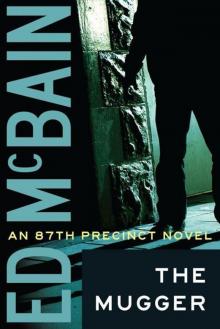 87th Precinct 02 - The Mugger
87th Precinct 02 - The Mugger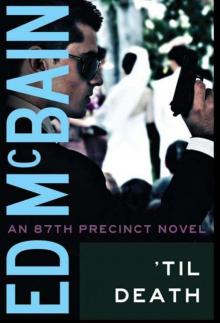 87th Precinct 09 - Til Death
87th Precinct 09 - Til Death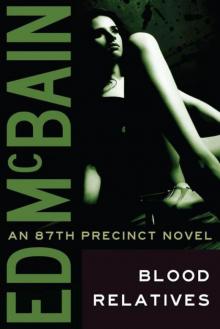 Blood Relatives (87th Precinct)
Blood Relatives (87th Precinct) Killer's Payoff
Killer's Payoff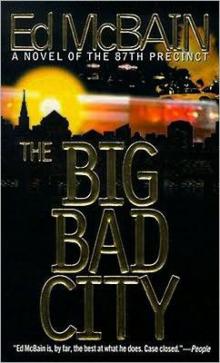 The Big Bad City
The Big Bad City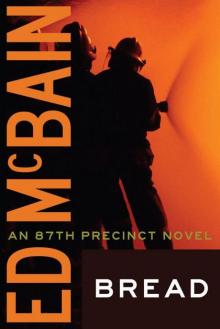 Bread (87th Precinct)
Bread (87th Precinct)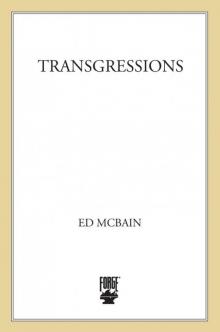 Transgressions Vol. 3
Transgressions Vol. 3 Runaway
Runaway So Long As You Both Shall Live (87th Precinct)
So Long As You Both Shall Live (87th Precinct)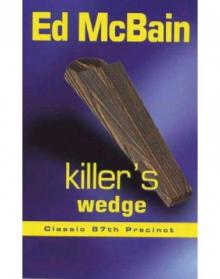 Killer's Wedge
Killer's Wedge